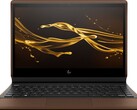More and more flagship smartphones are omitting the aging 3.5 mm audio jack in order to make room for larger batteries, thinner designs, and more advanced features to the chagrin of critics. It's not improbable, then, that super-thin laptops in the near future would begin to follow this trend for many of the same reasons.
When HP refreshed its Spectre 13 laptop in 2016, it was marketed as the world's thinnest Ultrabook for its size class. Perhaps as a direct consequence, it was also one of the first Windows laptops to ship without any full-size USB Type-A ports as it instead relied solely on USB Type-C. Reviewers everywhere were quick to point out this flaw even though HP included a USB Type-C to Type-A adapter in every box at no additional charge. Fast-forward three years and one of the best-selling 13-inch Windows laptops is now the USB Type-C-only Dell XPS 13.
One could argue that history may repeat itself but with the 3.5 mm audio port on the chopping block instead. While we can't predict the future, we want to know how readers may feel about laptops with no traditional audio jacks. Is it inevitable? Would it impact your buying decision more so than on a smartphone? Would you trade away the 3.5 mm port for another type of connection? How often do you use the 3.5 mm audio jack on your laptop, anyway?
Feel free to comment below and have a civil discussion on whether or not you think the 3.5 mm audio port has a future on ultra-thin laptops.



















